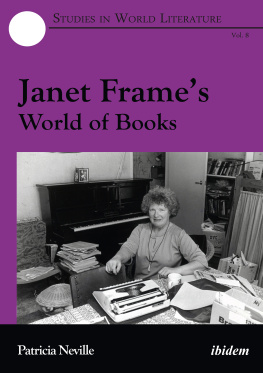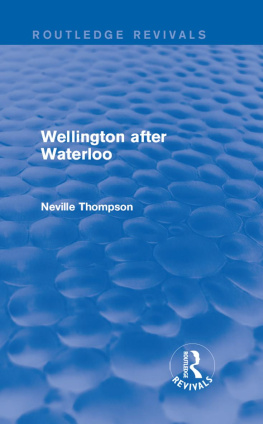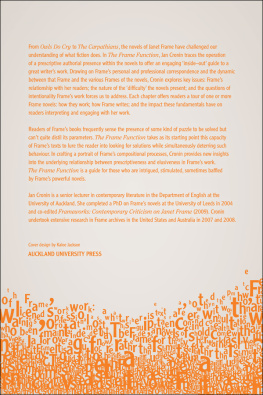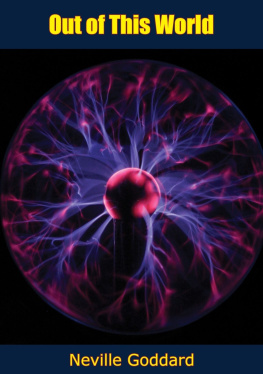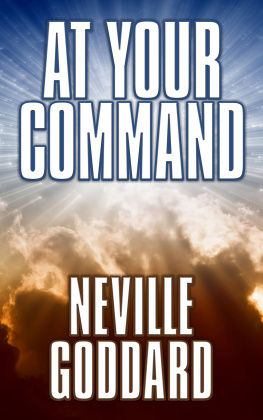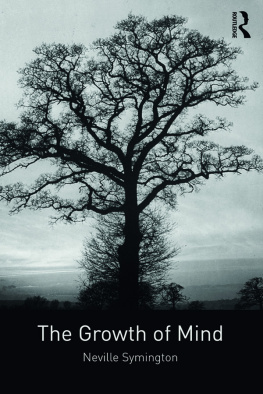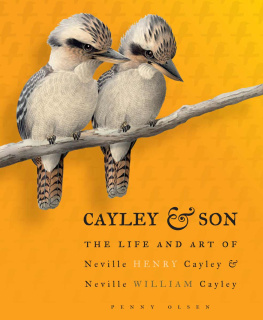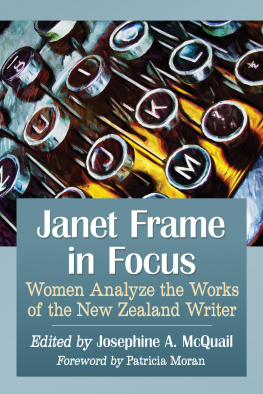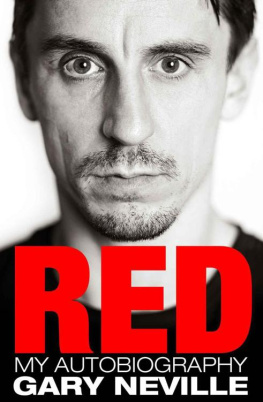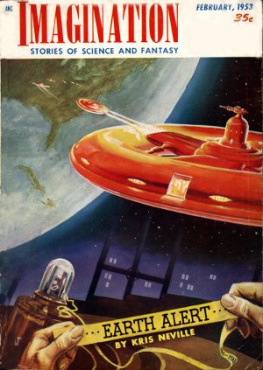Patricia Neville - Janet Frames World of Books
Here you can read online Patricia Neville - Janet Frames World of Books full text of the book (entire story) in english for free. Download pdf and epub, get meaning, cover and reviews about this ebook. year: 2019, publisher: Ibidem Press, genre: Art. Description of the work, (preface) as well as reviews are available. Best literature library LitArk.com created for fans of good reading and offers a wide selection of genres:
Romance novel
Science fiction
Adventure
Detective
Science
History
Home and family
Prose
Art
Politics
Computer
Non-fiction
Religion
Business
Children
Humor
Choose a favorite category and find really read worthwhile books. Enjoy immersion in the world of imagination, feel the emotions of the characters or learn something new for yourself, make an fascinating discovery.
- Book:Janet Frames World of Books
- Author:
- Publisher:Ibidem Press
- Genre:
- Year:2019
- Rating:4 / 5
- Favourites:Add to favourites
- Your mark:
- 80
- 1
- 2
- 3
- 4
- 5
Janet Frames World of Books: summary, description and annotation
We offer to read an annotation, description, summary or preface (depends on what the author of the book "Janet Frames World of Books" wrote himself). If you haven't found the necessary information about the book — write in the comments, we will try to find it.
Janet Frames World of Books — read online for free the complete book (whole text) full work
Below is the text of the book, divided by pages. System saving the place of the last page read, allows you to conveniently read the book "Janet Frames World of Books" online for free, without having to search again every time where you left off. Put a bookmark, and you can go to the page where you finished reading at any time.
Font size:
Interval:
Bookmark:

ibidem Press, Stuttgart
Table of Contents
Unless otherwise indicated, all references to Janet Frames works are to the following editions and abbreviated as shown:
AM The Adaptable Man 1965. New York: Braziller
CA The Complete Autobiography 1999. London: The
Womens Press
CP The Carpathians 2005. Auckland: Random House NZ
DB Daughter Buffalo 2008. Auckland: Random House NZ
EA The Edge of the Alphabet 1995. New York: George
Braziller
FW Faces in the Water 2009. London: Virago Press
IC Intensive Care 2008. Auckland: Random House NZ
LM Living in the Maniototo 1981. London: The
Womens Press
MM Mona Minim and the Smell of the Sun 2007. Auckland:
Random House NZ
MR In the Memorial Room 2013. Melbourne: Text Publishing
OC Owls Do Cry 2002. London: The Womens Press
PM The Pocket Mirror. London: The Womens Press
RB The Rainbirds 2006. Auckland: Random House NZ
SG Scented Gardens for the Blind 2000. London: The
Womens Press
SS A State of Siege 2006. Auckland: Random House NZ
ST Storms Will Tell 2008. Tarset: Bloodaxe Books
TS Towards Another Summer 2007 . Auckland: Random
House NZ
References to unpublished papers held in archive collections are abbreviated as shown.
In the Hocken Collections, University of Otago, Dunedin, New Zealand:
CBHThe papers of Charles Brasch.
FSHThe papers of Frank Sargeson.
HMHThe papers of Heather Murray.
JBHThe papers of James K. Baxter.
At Princeton University Library, Manuscripts Division, Department of Rare Books and Special Collections, USA:
GBPThe papers of George Braziller.
ODTOtago Daily Times.
Grateful acknowledgement is made to the Immediate Media Company for permission to use the illustrations of BBC radio programmes from the Radio Times; to the Janet Frame Literary Trust for the extract from The Adaptable Man; to the Hocken Collections, University of Otago, Dunedin, for extracts from the papers of James K. Baxter, Frank Sargeson and Charles Brasch; to the Estate of James K. Baxter for permission to quote from James K. Baxters correspondence; to the Estate of Charles Brasch for quotations from the poems and prose of Charles Brasch; to the Sargeson Trust for quotations from Frank Sargesons unpublished letters; to Princeton University Library for access to the archives of George Braziller, Inc. Every effort has been made to contact all copyright holders, and the publishers would be pleased to hear from anyone who believes their rights have been overlooked.
A Note on the Text: All inset poetry quotations, including Janet Frames juvenilia, are as faithful as possible to the published lineation. All translations, unless otherwise stated, are the authors own.
She weaves her prose from the thread and idiom of everyday speech. [...] Janet Frames stories echo with voices. (Dorothy Ballantyne, 4YA Radio Review, June 9, 1952)
What I admire no end are her brilliant verbal associationsand theyre not merely verbal or literary. (Frank Sargeson, Letter to William Plomer, September 15, 1957)
These comments on Janet Frames early fiction by two of her fellow New Zealanders, written before she left New Zealand for Europe and America, indicate a perception that even at the very beginning of her adult writing career Frame was doing something that was both innovative and unrestricted by her New Zealand nationality. Frames interweaving of different voices is identified by Dorothy Ballantyne, the eminent New Zealand librarian and critic, and Frank Sargeson, who was at that time one of New Zealands foremost writers. Frame references literature from across the world and this interconnectedness or intertextuality was central to her identity as a writer, and a key characteristic of her mature style. Ballantyne is reviewing The Lagoon and Other Stories (1952), Frames first, award-winning book of short stories, and Sargeson is commenting on Frames first novel, Owls Do Cry (1957). Both critics are stunned by her brilliant originality, their observations pointing towards Frames imaginative, creative mindset and her intensely allusive, intertextual style. Sargeson is puzzled, unable to pinpoint precisely the range or complexity of this novel, which departs so fundamentally from the social-realist style of New Zealand fiction which prevailed in the 1930s to 1960s.
Early critical writing about Frame in New Zealand, largely biographical in orientation, tended either to focus on her account of repressive, puritanical and punitive New Zealand society in the post-war years, or to interpret her novels predominantly in relation to her extraordinary life history. However, in his 1957 review of Owls Do Cry in Landfall, Winston Rhodes, while sympathizing with those watching for the great New Zealand novel, perceives that Frame is giving us something much wider when he asserts that she brings us closer not to the average New Zealander, but to common humanity in its suffering and search (32829). For all its identifiable locations and New Zealand English, Owls Do Cry deals with universal themes and events which are not dependent on their setting for their significance. Small-minded, puritanical and provincial attitudes are not confined to New Zealand. The conditions in mental hospitals which Frame delineates were common everywhere at that time. Ken Bragan (1993), who came to work at Seacliff Mental Hospital in 1955, near Dunedin, where Frame had been a patient, recalls conditions in the Scottish mental hospital where he worked in the 1950s as so appalling as to be beyond description; these conditions would have been similar to those endured by Janet Frame for months on end (133). Her years as a patient in these hospitals gave Frame access to universal experiences of mental suffering endured by the inmates of such institutions the world over.
At this early stage, Frame was largely regarded as a specifically New Zealand writer, an exciting new local talent writing in the tradition of the New Zealand short story, although Ballantyne was clear from the start that Frame also extends that tradition (Ballantyne 1952, 2). Owls Do Cry was published in the USA in 1959 and all her novels appeared in Britain and the USA as they were completed. By the early 1960s her work began to appear in translation in France, Germany, Spain, Italy and the Netherlands. Publication overseas began to change the way Frame was perceived, and within a decade she had gained international recognition. Her novels, short stories, poetry and autobiography have now been translated into 14 European languages and three from the Far East, Korean (2012), Japanese (1991, 1994) and Chinese (1993), forming a further extended transnational exchange of creativity, and confirming Frames place in world literature. This book explores the verbal echoes and associations with which Frame locates herself in a world-wide community of writers.
Janet Frame was awarded the Commonwealth Writers Prize in 1989 for her final novel, The Carpathians. The shifting terminology used for literature written in English, or translated into English, from outside the British Isles or by immigrants to BritainCommonwealth, Postcolonial, World Literature in Englishowes much to the changing political scene, especially since the end of World War II, and the dismantling of the former British Empire, as well as to the globilization of the publishing industry. Increasingly, multi-cultural Britain has honoured migrant and second-generation writers, both from its former empire and from other countries, often people whose mother tongue was a minority language, and who chose to write in English. These include writers like Joseph Conrad (18571924), the former Polish seaman, writing during the British Empires heyday; Salman Rushdie, who was born in India in 1947, and came to Britain as a schoolboy; V.S. Naipaul, born in 1932, who grew up in Trinidad, came on a scholarship to study at Oxford, and later worked for the BBC; and Kazuo Ishiguro, born in 1954, whose Japanese parents came to England when he was a small child. English has remained, through an accident of history, the worlds dominant language in literature as it is in science. The re-adoption of Goethes broad term
Font size:
Interval:
Bookmark:
Similar books «Janet Frames World of Books»
Look at similar books to Janet Frames World of Books. We have selected literature similar in name and meaning in the hope of providing readers with more options to find new, interesting, not yet read works.
Discussion, reviews of the book Janet Frames World of Books and just readers' own opinions. Leave your comments, write what you think about the work, its meaning or the main characters. Specify what exactly you liked and what you didn't like, and why you think so.

